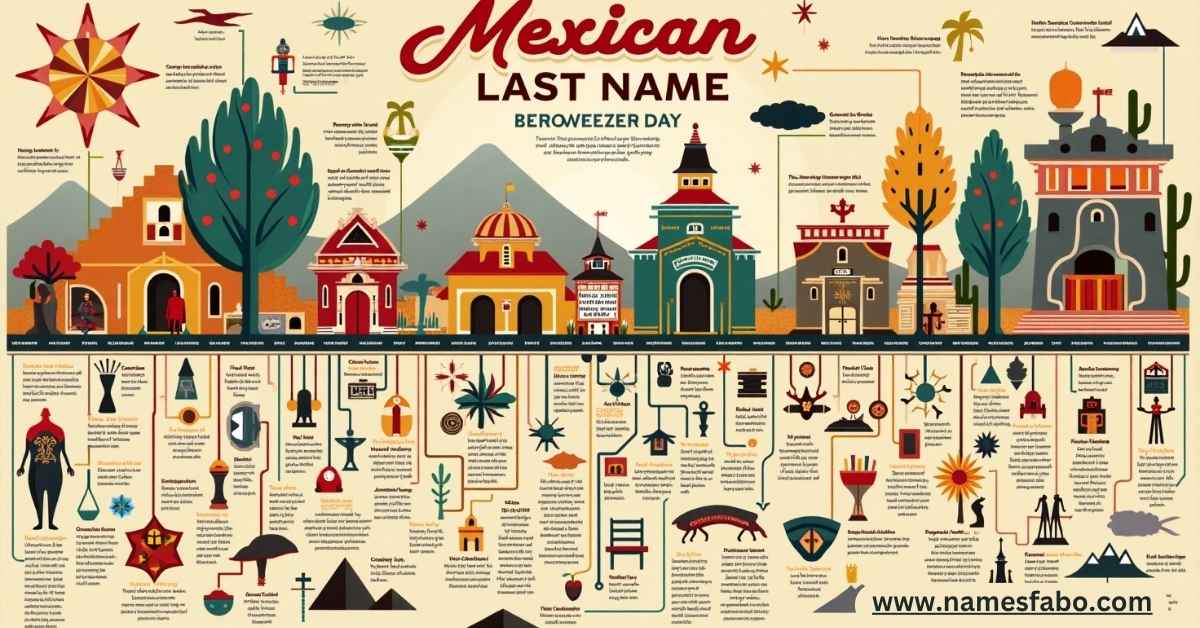Your Mexican last names carry centuries of stories. Each surname connects you to Spanish conquistadors, indigenous warriors, or colonial artisans. Over 38.2 million Mexican Americans live in the USA today, making Mexican surnames origins more relevant than ever.
What are the most common Mexican last names? García, González, and Hernández top the list. But thousands of unique surnames tell deeper stories. This guide explores meaning of Mexican last names from ancient Aztec roots to modern variations.
Whether you’re researching Mexican heritage surnames or choosing names for babies, you’ll discover fascinating connections. Your family name isn’t just a label it’s your cultural DNA.
The History of Mexican Last Names
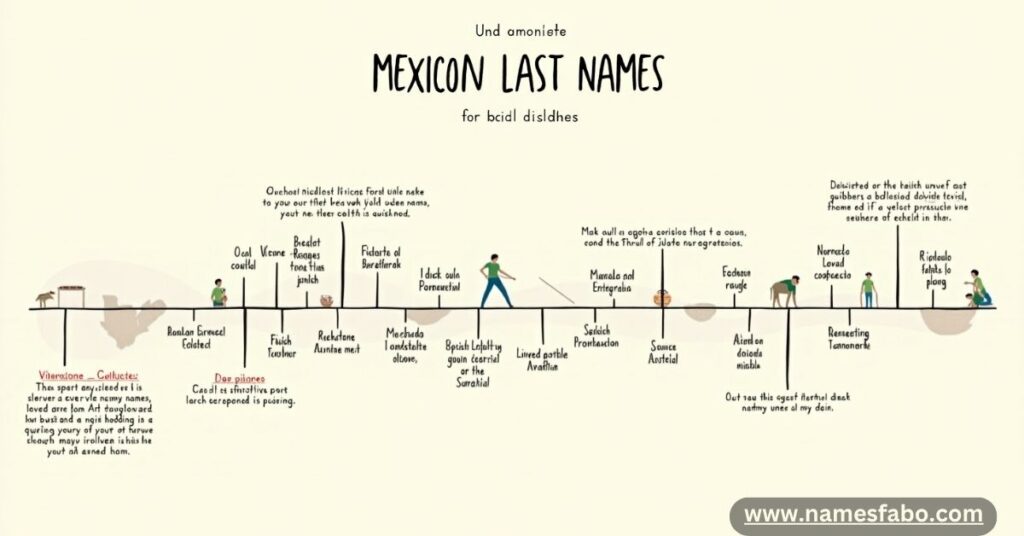
Mexican last names evolved through three major periods that shaped modern Mexican surname history. Pre-colonial indigenous cultures used nature-based naming systems. Spanish colonization introduced European patronymic traditions. Post-independence Mexico blended these influences into today’s rich Mexican naming customs.
The transformation wasn’t simple or uniform. Indigenous Mexican last names survived Spanish conquest through clever adaptations. Many families hid Aztec or Maya heritage inside Spanish-sounding surnames. This created the complex Mexican surnames and history we see today.
Pre-Colonial Indigenous Roots
Before 1519, Aztec last names and Mayan surnames Mexico followed completely different patterns. Indigenous cultures used descriptive names based on natural phenomena, personal traits, or spiritual beliefs. These indigenous Mexican last names often honored gods, animals, or celestial events.
How Mexican last names are formed originally depended on birth circumstances. A child born during a thunderstorm might receive a storm-related name. Mexican last names derived from nature dominated pre-colonial naming systems. Names like Xochitl (flower) or Itzel (rainbow lady) survived Spanish colonization.
Meaning of indigenous Mexican surnames often connected families to their environment. Coastal people used ocean-related names. Mountain communities chose names reflecting high-altitude life. This geographic connection explains Mexican last names by region differences we see today.
Spanish Colonial Impact (1519-1821)
Spanish conquistadors brought Spanish surnames Mexico traditions that transformed indigenous naming forever. The colonial period introduced patronymic systems where children inherited their father’s surname. This Mexican last names and colonial history explained shows how European customs replaced indigenous practices.
Mexican last names from colonial era reflect social hierarchies. Spanish-born colonists kept pure Spanish surnames. Indigenous people often received Spanish names during Catholic baptisms. Mexican surnames related to professions emerged as colonial society developed specialized trades.
How Mexican last names evolved over time during colonization created lasting patterns. Religious names multiplied as Catholic missionaries baptized indigenous populations. Saints’ names became common middle names. Mexican surnames with religious roots dominated colonial records.
Evolution Through Mexican Independence
After 1821, independent Mexico developed unique Mexican naming conventions that blended Spanish and indigenous traditions. Mexican last names ranking began reflecting nationalist pride rather than colonial status. Many families reclaimed indigenous names or created new combinations.
The post-independence period saw Mexican surnames migration as people moved freely across the new nation. Mexican surnames distribution shifted from colonial administrative centers to economic opportunities. This movement created Mexican surnames variations across different regions.
Read More About : Last Names: 1,000 + Most Common in the U.S. |2025|
Mexican Naming Traditions
Traditional Mexican last names follow specific patterns that preserve both paternal and maternal family lines. Unlike American customs, Mexican family names traditionally include two surnames. This system ensures Mexican last names and family lineage preservation through generations.
Mexican surnames and naming traditions create unique identity markers. Every person carries their father’s first surname plus their mother’s first surname. This how Mexican surnames connect families system maintains family connections across multiple generations.
The Two-Surname System
How Mexican last names are passed down follows a specific formula. Children receive their father’s paternal surname first, followed by their mother’s paternal surname. For example, if Carlos García López marries María Hernández Rivera, their children become [First Name] García Hernández.
This Mexican last names and patronymic traditions system preserves maternal lineage better than single-surname cultures. Mexican last names passed down maternally maintain the mother’s family identity. Many Mexican surnames and clan systems trace ancestry through both parents’ lines.
Mexican last names and naming patterns adapt differently in various regions. Northern Mexico often emphasizes paternal lines more strongly. Southern regions with stronger indigenous influences may preserve matrilineal naming elements. Mexican last names by frequency by state reflects these regional preferences.
Marriage and Name Changes
Mexican naming customs traditionally add the husband’s surname with “de” (meaning “of”). A woman named María García López marrying Juan Martinez Ruiz becomes María García López de Martinez. However, modern Mexican surnames increasingly skip this traditional addition.
Mexican last names and modern usage shows changing attitudes toward gender equality. Many contemporary Mexican women keep their birth surnames after marriage. Mexican last names for Hispanic families in the USA often adapt to American naming conventions while preserving cultural elements.
Mexican surnames and patronymics create complex family trees that genealogists love. Each generation carries forward four family lines through the two-surname system. This makes Mexican last names for genealogy research incredibly rich but sometimes challenging.
Mexican Last Names and Meanings
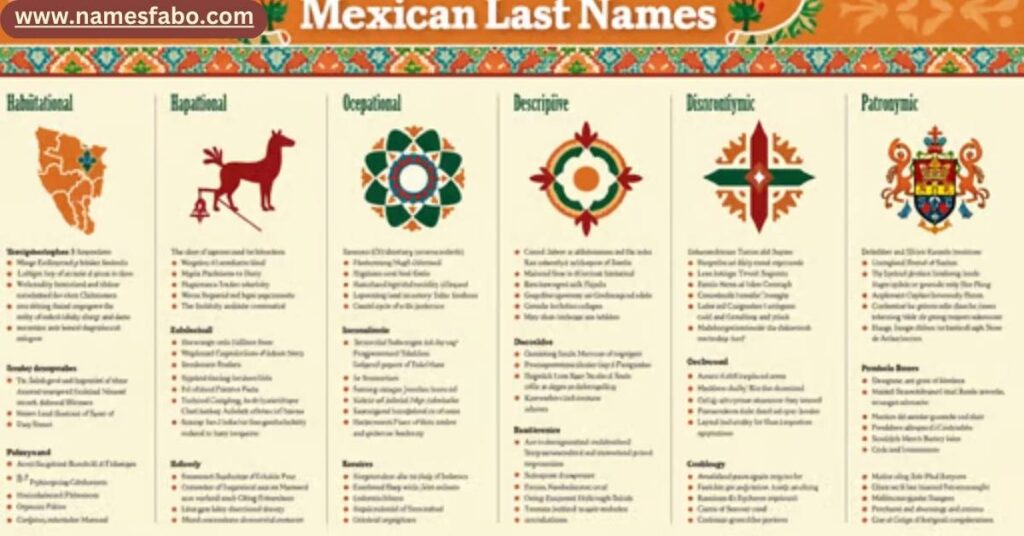
Mexican last names with meanings reveal fascinating stories about family origins, occupations, and characteristics. Surnames etymology draws from Spanish, Arabic, indigenous, and even Germanic sources. Understanding these Mexican last names meaning in English connects you to centuries of cultural evolution.
Mexican last names and their origins fall into several categories: habitational, occupational, patronymic, and descriptive. Each category tells different stories about how families lived, worked, and identified themselves. Mexican surnames origin stories often surprise people with their unexpected connections.
Geographic Origins
Mexican last names derived from places show where families originally lived. Habitational surnames indicate specific towns, regions, or geographical features. Mexican last names by region often cluster around their original locations, creating surname maps across Mexico.
- Rivera – “riverbank” – families living near water sources
- Monte – “mountain” – highland dwelling families
- Vega – “meadow” – families from fertile plains
- Torres – “towers” – people living near fortifications
- Campos – “fields” – agricultural region families
- Serrano – “mountain dweller” – high-altitude communities
- Navarro – from Navarre region in Spain
- Castillo – “castle” – families near fortified structures
- Medina – “city” – urban dwelling families
- Herrera – “blacksmith area” – metalworking communities
Occupational Surnames
Mexican surnames related to professions preserve medieval job titles and trades. These Mexican surnames connected to professions show how colonial society organized work and social status. Many Mexican surnames cultural significance relates to essential community roles.
- Herrero – “blacksmith” – metalworking families
- Sastre – “tailor” – clothing craftsmen
- Pescador – “fisherman” – coastal fishing families
- Guerrero – “warrior” – military service families
- Pastor – “shepherd” – livestock tending families
- Carpintero – “carpenter” – woodworking craftsmen
- Panadero – “baker” – bread making families
- Minero – “miner” – mountain extraction workers
- Comerciante – “merchant” – trading families
- Labrador – “farmer” – agricultural workers
Patronymic Names
What are the most common Mexican last names often come from patronymic traditions. These surnames mean “son of” or “daughter of” specific ancestors. Mexican surnames and their meanings for baby names help parents understand family heritage connections.
- González – “son of Gonzalo” (battle-ready)
- Hernández – “son of Hernando” (brave journey)
- Martínez – “son of Martín” (warlike)
- López – “son of Lope” (wolf)
- Sánchez – “son of Sancho” (sanctified)
- Pérez – “son of Pedro” (rock/stone)
- Ramírez – “son of Ramiro” (famous counselor)
- Gutiérrez – “son of Gutierrez” (army ruler)
- Jiménez – “son of Jimeno” (listener)
- Rodríguez – “son of Rodrigo” (famous power)
Read More : Russian Last Names : A Detailed Guide in 2025
Descriptive Surnames
Mexican last names with symbolic meaning describe physical characteristics, personality traits, or family qualities. These Mexican surnames with symbolism created instant identification in medieval communities. Surnames and cultural symbolism continues influencing name choices today.
- Moreno – “dark-haired” or “brunette”
- Rubio – “blonde” or “red-haired”
- Delgado – “thin” or “slender”
- Pequeño – “small” or “short”
- Grande – “tall” or “big”
- Fuerte – “strong” or “powerful”
- Blanco – “white” or “fair-skinned”
- Morales – “blackberry bush dweller”
- Cano – “white-haired” or “gray-haired”
- Sereno – “calm” or “peaceful”
Mexican Surnames
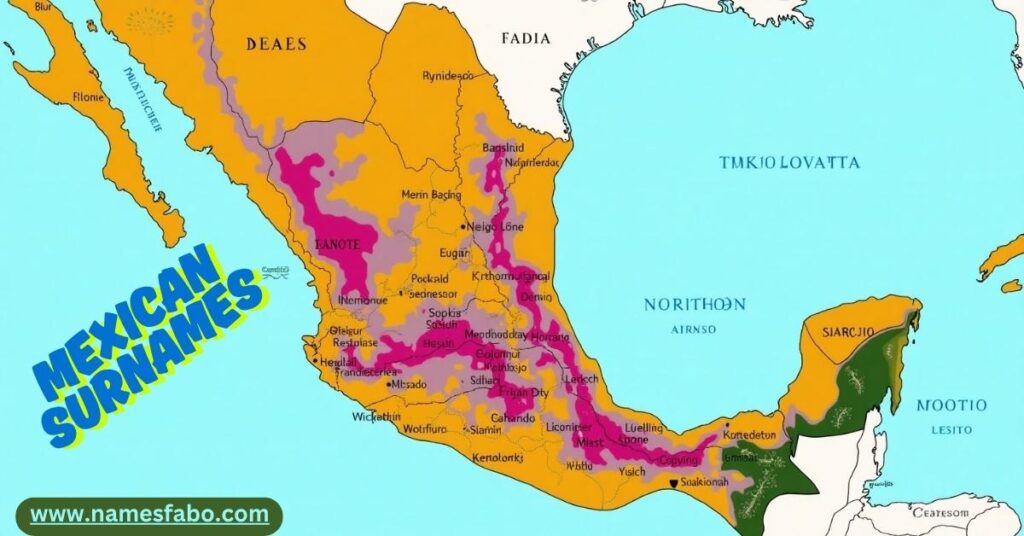
Mexican surnames reflect the country’s complex cultural heritage through diverse linguistic influences. Spanish surnames Mexico dominate due to colonial history, but indigenous Mexican surnames add unique depth. Surnames and language influence creates fascinating etymological puzzles.
Mexican last names and mestizo heritage explained shows how different cultures blended through intermarriage. Mexican surnames connected to nobility preserve aristocratic Spanish lineages. Meanwhile, Mexican surnames with Arabic influence reflect medieval Spanish-Moorish connections that traveled to the New World.
Regional Surname Patterns
Mexican last names by region show distinct patterns based on historical settlement, indigenous populations, and geographic features. Northern Mexico displays stronger Spanish influence due to mining and ranching. Southern regions preserve more indigenous Mexican surnames through isolated communities.
Mexican surnames distribution varies dramatically across the country’s 32 states. Mexican surnames and regional dialects sometimes modify pronunciation or spelling of identical surnames. Surnames frequency by state creates interesting demographic maps.
Northern Mexico Surnames
- Valdez – “son of Baldo” (bold)
- Morales – “mulberry tree area”
- Reyes – “kings” (royal connection)
- Aguilar – “eagle’s nest”
- Contreras – “opposite side”
- Espinoza – “thornbush place”
- Sandoval – “sandy grove”
- Cortés – “courteous person”
- Mendoza – “cold mountain”
- Figueroa – “fig tree area”
Central Mexico Surnames
- Velázquez – “son of Velasco” (raven)
- Ortega – “nettle place”
- Vargas – “steep place”
- Romero – “pilgrim to Rome”
- Morales – “blackberry area”
- Cabrera – “goat place”
- Guerrero – “warrior”
- Mendoza – “cold mountain”
- Herrera – “ironworks area”
- Lozano – “luxuriant” (abundant)
Southern Mexico Surnames
- Xólotl – Aztec god name (lightning dog)
- Citlali – “star” in Nahuatl
- Itzel – Maya “rainbow lady”
- Nayeli – “I love you” in Navajo
- Xochitl – “flower” in Nahuatl
- Tlacaelel – “man of valor” in Nahuatl
- Yaretzi – “you will always be loved”
- Itzamná – Maya creator god
- Cuauhtémoc – “descending eagle”
- Moctezuma – “angry lord”
Read More About : Spanish Last Names and Meanings: The Ultimate Guide (2025)
Unique Mexican Last Names
Unique Mexican last names preserve rare linguistic treasures and family histories. Surnames 2025 includes both ancient indigenous survivals and modern creative combinations. How to find rare Mexican surnames requires exploring genealogical records, indigenous communities, and colonial archives.
Best Mexican last names for uniqueness often combine indigenous roots with Spanish adaptations. Mexican last names with special meanings connect families to specific cultural or spiritual traditions. These rare Hispanic surnames help families maintain distinct identities in diverse communities.
Indigenous-Origin Surnames
Mexican last names derived from Aztec culture preserve pre-Columbian heritage through careful linguistic survival. Meaning of indigenous Mexican surnames often honors natural forces, spiritual beliefs, or ancestral achievements. Mexican surnames with mythological meaning connect families to ancient divine traditions.
- Quetzalcóatl – “feathered serpent” (Aztec deity)
- Tenochtitlan – “place of the prickly pear cactus”
- Nezahualcóyotl – “fasting coyote” (poet king)
- Tlacaelel – “man of strong heart”
- Xochiquetzal – “flower feather” (goddess)
- Mictlantecuhtli – “lord of the dead”
- Chalchiuhtotolin – “jeweled fowl”
- Tláloc – “he who makes things sprout”
- Coatlicue – “serpent skirt” (earth goddess)
- Huitzilopochtli – “hummingbird of the south”
Rare Spanish Colonial Names
Mexican surnames connected to nobility preserve aristocratic Spanish lineages that established colonial power structures. Mexican last names and social class historically indicated family status and privileges. Surnames in official government records document these hierarchical distinctions.
- Montemayor – “greater mountain”
- Villanueva – “new town”
- Valdemar – “famous ruler”
- Altamirano – “high view”
- Coronado – “crowned one”
- Villareal – “royal town”
- Montalvo – “white mountain”
- Peñafiel – “faithful rock”
- Valenzuela – “little valley”
- Cervantes – “deer hunter”
Modern Creative Surnames
Mexican last names for baby naming trends 2025 includes families creating new surnames by combining traditional elements. How to create Mexican last names involves understanding cultural patterns while respecting heritage. Mexican surnames and modern culture embraces creative naming freedom.
- Lunasol – “moon sun” (modern combination)
- Estrellita – “little star” (diminutive)
- Corazón – “heart” (emotional connection)
- Esperanza – “hope” (virtue name)
- Libertad – “freedom” (political ideal)
- Paloma – “dove” (peace symbol)
- Cielo – “sky” (nature connection)
- Mariposa – “butterfly” (transformation)
- Diamante – “diamond” (precious gem)
- Milagro – “miracle” (divine gift)
Popular Mexican Last Names
Popular Mexican last names in 2025 continue reflecting historical patterns while adapting to modern usage. Top Mexican family names by region show how migration and intermarriage spread certain surnames across the country. Mexican last names popular in the United States often represent the most common surnames among Mexican-American communities.
Top Mexican surnames by popularity have remained relatively stable for generations. What is the most popular last name in Mexico varies by region, but García consistently ranks at the top nationally. Mexican last names ranking 2025 shows slight shifts due to demographic changes and cultural preferences.
Top 20 Most Popular Mexican Surnames
Most common last names in Mexico 2025 reflect centuries of Spanish colonial influence mixed with indigenous survival. Mexican surnames list by frequency helps genealogists and researchers understand surname distribution patterns. Common surnames in Mexico provide insight into historical migration and settlement patterns.
| Rank | Surname | Meaning | Origin | Estimated Population |
| 1 | García | “son of García” (spear rule) | Spanish | 4.2 million |
| 2 | González | “son of Gonzalo” (battle) | Spanish | 3.8 million |
| 3 | Hernández | “son of Hernando” (brave journey) | Spanish | 3.5 million |
| 4 | López | “son of Lope” (wolf) | Spanish | 3.2 million |
| 5 | Martínez | “son of Martín” (warlike) | Spanish | 2.9 million |
| 6 | Pérez | “son of Pedro” (rock) | Spanish | 2.7 million |
| 7 | Sánchez | “son of Sancho” (sanctified) | Spanish | 2.5 million |
| 8 | Ramírez | “son of Ramiro” (counselor) | Spanish | 2.3 million |
| 9 | Torres | “towers” | Spanish | 2.1 million |
| 10 | Flores | “flowers” | Spanish | 1.9 million |
Regional Popularity Variations
Mexican last names and how they reflect heritage varies significantly across Mexico’s diverse geography. Mexican last names ranking differs between urban centers and rural communities. Surnames and historical migration created pockets of surname concentration in specific regions.
Mexican surnames distribution follows historical settlement patterns, economic opportunities, and geographic barriers. Mexican surnames by region analysis reveals fascinating migration stories and cultural preservation efforts.
- Northern States (Nuevo León, Chihuahua): García, González, Hernández
- Central States (Mexico City, Puebla): López, Martínez, Pérez
- Southern States (Oaxaca, Chiapas): Morales, Cruz, Jiménez
- Coastal States (Veracruz, Guerrero): Rivera, Herrera, Vargas
- Western States (Jalisco, Michoacán): Rodríguez, Moreno, Castillo
Famous Mexican Last Names
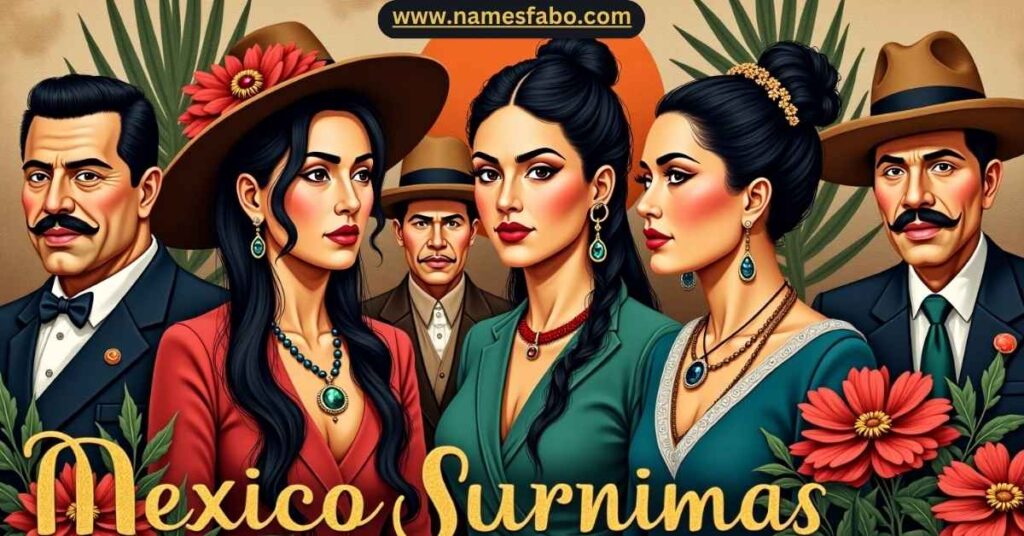
Famous Mexican last names list includes surnames that shaped history, culture, and society. Surnames reveal how certain families influenced Mexico’s development. Famous Mexican last names used in literature and Mexican surnames in history books preserve these important family legacies for future generations.
Mexican surnames with famous bearers often carry extra cultural weight and recognition. Mexican surnames and social identity can be influenced by historical associations with these prominent surnames. Surnames and historical figures create lasting connections between family names and national identity.
Revolutionary Leaders
Mexican surnames and historical figures from the Revolutionary period (1910-1920) remain deeply embedded in national consciousness. These Mexican last names origin stories connect to pivotal moments in Mexican independence and social transformation.
- Zapata – “shoemaker” – Emiliano Zapata (revolutionary leader)
- Villa – “town/settlement” – Pancho Villa (revolutionary general)
- Carranza – “oak grove” – Venustiano Carranza (president)
- Obregón – “worker” – Álvaro Obregón (president)
- Madero – “wood/timber” – Francisco I. Madero (president)
- Huerta – “orchard” – Victoriano Huerta (general)
- Calles – “streets” – Plutarco Elías Calles (president)
- Cárdenas – “purple dye” – Lázaro Cárdenas (president)
- Díaz – “son of Diego” – Porfirio Díaz (dictator)
- Morelos – “mulberry trees” – José María Morelos (independence hero)
Read More : Japanese Last Names: 1500+ with Deep Meaning & Beauty
Cultural Icons
Mexican last names and cultural pride connects to artists, writers, and entertainers who achieved international recognition. These Mexican surnames with creative meanings inspire contemporary families choosing names that honor cultural achievements.
- Kahlo – German origin – Frida Kahlo (artist)
- Rivera – “riverbank” – Diego Rivera (muralist)
- Orozco – “heath/brushwood” – José Clemente Orozco (artist)
- Siqueiros – “fig trees” – David Alfaro Siqueiros (muralist)
- Paz – “peace” – Octavio Paz (Nobel Prize poet)
- Rulfo – Germanic origin – Juan Rulfo (writer)
- Fuentes – “fountains” – Carlos Fuentes (novelist)
- Castellanos – “castle dwellers” – Rosario Castellanos (poet)
- Garro – “oak tree” – Elena Garro (writer)
- Poniatowska – Polish origin – Elena Poniatowska (journalist)
Modern Entertainment
Mexican last names and modern culture includes contemporary celebrities who maintain cultural connections while achieving international success. Mexican surnames for boys and Mexican surnames for girls often reflect these modern role models.
- Hayek – Lebanese origin – Salma Hayek (actress)
- García – “spear rule” – Gael García Bernal (actor)
- Luna – “moon” – Diego Luna (actor)
- Derbez – French origin – Eugenio Derbez (comedian)
- Bichir – Lebanese origin – Demián Bichir (actor)
- Guerrero – “warrior” – Vladimir Guerrero (baseball)
- Ochoa – “wolf” – Guillermo Ochoa (soccer goalkeeper)
- Hernández – “son of Hernando” – Javier Hernández (soccer)
- Canelo – “cinnamon” – Saúl Álvarez (boxer)
- Marquez – “son of Marcus” – Juan Manuel Márquez (boxer)
Cool & Funny Mexican Last Names
Cool Mexican last names often sound powerful, mysterious, or carry interesting literal translations. Mexican surnames with linguistic roots create unique sound combinations that appeal to modern naming sensibilities. Best Mexican surnames for “cool factor” combine strong consonants with meaningful heritage connections.
Mexican surnames pronunciation affects how names sound to English speakers. Some surnames create amusing situations when translated literally, while others carry dignified weight. Mexican surnames with symbolism can be both meaningful and memorable.
Strong-Sounding Surnames
Mexican last names and cultural pride includes surnames that sound powerful and confident. These Mexican surnames with symbolism often relate to natural forces, noble qualities, or historical strength.
- Guerrero – “warrior” (battle-ready strength)
- León – “lion” (fierce courage)
- Fuego – “fire” (passionate intensity)
- Tormenta – “storm” (natural power)
- Acero – “steel” (unbreakable strength)
- Rayo – “lightning” (swift power)
- Volcán – “volcano” (explosive force)
- Trueno – “thunder” (commanding presence)
- Hierro – “iron” (solid endurance)
- Dragón – “dragon” (mythical power)
Nature-Inspired Cool Names
Mexican last names derived from nature create beautiful sound patterns while maintaining cultural authenticity. Mexican surnames that mean moon and other celestial references add mystical appeal to family heritage.
- Estrella – “star” (celestial beauty)
- Cielo – “sky” (infinite expanse)
- Océano – “ocean” (vast depth)
- Montaña – “mountain” (towering strength)
- Bosque – “forest” (natural wisdom)
- Cascada – “waterfall” (flowing grace)
- Cristal – “crystal” (pure clarity)
- Diamante – “diamond” (precious rarity)
- Esmeralda – “emerald” (green treasure)
- Coral – “coral” (ocean gem)
Amusing Literal Translations
Some Mexican surnames meaning in English create humorous situations when translated directly. Mexican surnames and folklore includes names that sound serious in Spanish but amusing in English translation.
- Borrego – “lamb” (gentle sheep)
- Gallo – “rooster” (morning crow)
- Pescado – “fish” (swimming creature)
- Pollo – “chicken” (farmyard bird)
- Caballo – “horse” (riding animal)
- Ratón – “mouse” (tiny rodent)
- Oso – “bear” (forest giant)
- Conejo – “rabbit” (hopping creature)
- Pato – “duck” (water bird)
- Mono – “monkey” (playful primate)
Read More About : Chinese Last Names 2025: Ultimate Meanings & Lineage List
Common Mexican Last Names
Common Mexican last names represent the backbone of Mexican genealogy and cultural identity. Mexican last names list by frequency helps researchers understand demographic patterns and family connections. How to trace Mexican surnames in genealogy often starts with these most frequently encountered surnames.
Mexican family names that appear commonly across different regions indicate successful family lines that spread throughout the country. Mexican surnames for genealogical research benefits greatly from understanding these widespread surname patterns.
Everyday Mexican Surnames
Mexican surnames database contains thousands of common names that you’ll encounter in any Mexican or Mexican-American community. Mexican surnames database 2025 shows remarkable consistency in the most frequent surnames across generations.
- García – patronymic “son of García”
- González – patronymic “son of Gonzalo”
- Hernández – patronymic “son of Hernando”
- López – patronymic “son of Lope”
- Martínez – patronymic “son of Martín”
- Pérez – patronymic “son of Pedro”
- Sánchez – patronymic “son of Sancho”
- Ramírez – patronymic “son of Ramiro”
- Cruz – “cross” (religious symbol)
- Flores – “flowers” (nature reference)
- Morales – “mulberry trees” (habitational)
- Jiménez – patronymic “son of Jimeno”
- Rivera – “riverbank” (geographic)
- Rodríguez – patronymic “son of Rodrigo”
- Moreno – “dark-haired” (descriptive)
- Gutiérrez – patronymic “son of Gutierrez”
- Ortiz – patronymic “son of Orton”
- Torres – “towers” (architectural)
- Vargas – “steep slope” (topographic)
- Castillo – “castle” (fortification)
Regional Common Names
Mexican last names by region shows how certain surnames cluster in specific areas due to historical settlement patterns. Surnames and historical migration created these regional concentrations that persist today.
Mexican last names and regional dialects sometimes affect pronunciation and spelling of identical surnames. Mexican surnames distribution reflects economic opportunities, geographic barriers, and cultural preferences.
Northern Mexico Common Names
- Valdez – “son of Baldo”
- Reyes – “kings”
- Morales – “mulberry area”
- Contreras – “opposite banks”
- Aguilar – “eagle place”
Central Mexico Common Names
- Velázquez – “son of Velasco”
- Mendoza – “cold mountain”
- Herrera – “ironworks”
- Guerrero – “warrior”
- Cabrera – “goat place”
Southern Mexico Common Names
- Morales – “blackberry area”
- Cruz – “cross”
- Jiménez – “son of Jimeno”
- Díaz – “son of Diego”
- Ruiz – “son of Ruy”
Read More : Korean Last Names: 500+ You Probably Heard In K-Dramas
What Are Rare Mexican Last Names?
Rare Mexican last names preserve unique cultural heritage and linguistic treasures that few families maintain. How to find rare Mexican surnames requires exploring genealogical archives, indigenous community records, and colonial documentation. Rare Hispanic surnames explained reveals fascinating stories of survival and cultural preservation.
What makes a Mexican last name unique depends on several factors: geographic isolation, small family size, cultural assimilation, or historical circumstances. Mexican surnames and heritage preservation includes efforts to maintain these endangered surname traditions.
Defining Surname Rarity
Mexican surnames database categorizes rare names as those occurring in fewer than 1,000 families nationwide. Mexican last names in official government records help researchers identify truly uncommon surnames. Surnames and official surname databases provide statistical baselines for rarity measurements.
How to research Mexican surnames for rarity requires understanding population distributions and historical documentation. Mexican surnames for genealogy research often focuses on these uncommon names because they’re easier to trace through historical records.
Pre-Columbian Survivals
Mexican last names derived from Aztec culture represent the rarest category of Mexican surnames. Meaning of indigenous Mexican surnames often connects to pre-conquest spiritual beliefs, natural phenomena, or tribal governance. Mexican surnames with mythological meaning preserve ancient religious traditions.
- Cuauhtémoc – “descending eagle” (last Aztec emperor)
- Moctezuma – “angry lord” (Aztec ruler)
- Nezahualcóyotl – “fasting coyote” (poet king)
- Tlacaelel – “man of strong heart” (Aztec advisor)
- Xochiquetzal – “flower feather” (goddess name)
- Itzamná – Maya creator god
- Kukulcán – Maya feathered serpent
- Chaac – Maya rain god
- Ixchel – Maya moon goddess
- Hunab Ku – Maya supreme god
Colonial-Era Rare Names
Mexican surnames connected to nobility during colonial times often became rare through family extinction or social changes. Mexican last names and social class history shows how aristocratic surnames disappeared as social hierarchies shifted.
- Montemayor – “greater mountain” (noble title)
- Altamirano – “high view” (elevated status)
- Coronado – “crowned one” (royal connection)
- Valdemar – “famous ruler” (Germanic noble)
- Peñafiel – “faithful rock” (loyalty badge)
- Villareal – “royal town” (crown settlement)
- Montalvo – “white mountain” (pure elevation)
- Cervantes – “deer hunter” (noble pursuit)
- Valenzuela – “little valley” (protected place)
- Pimentel – “pepper field” (spice merchant)
Geographic Isolation Names
Mexican last names by region includes surnames that survived in isolated communities due to geographic barriers. Mexican surnames and clan traditions preserved unique names in mountain villages, desert communities, or island populations.
- Barranca – “ravine” (canyon dweller)
- Isleta – “little island” (isolated location)
- Cañada – “narrow valley” (protected settlement)
- Meseta – “plateau” (high flat land)
- Península – “peninsula” (water-surrounded land)
- Archipiélago – “archipelago” (island chain)
- Cabo – “cape” (land point)
- Bahía – “bay” (protected water)
- Estrecho – “strait” (narrow passage)
- Golfo – “gulf” (large bay)
Read More :
Most Common Last Names In Mexico
Mexican surnames reflect the rich tapestry of the nation’s history, blending Spanish colonial influences with indigenous roots. Understanding what is the most popular last name in Mexico helps us appreciate how Mexican surnames and their frequency by state varies across different regions. These common surnames in Mexico tell stories of family lineage, cultural heritage, and historical migration patterns.
National Statistics Overview
Mexican last names ranking 2025 shows fascinating patterns in surname distribution across the country. The Mexican surnames database reveals that certain names dominate due to historical Spanish conquest patterns and regional settlement factors. How Mexican last names evolved over time demonstrates the lasting impact of colonial naming conventions on modern Mexican society.
Top 15 Most Common Mexican Last Names:
- García – Meaning “son of García” (spear rule)
- González – “Son of Gonzalo” (battle-ready)
- Hernández – “Son of Hernando” (brave journey)
- López – “Son of Lope” (wolf)
- Martínez – “Son of Martín” (warlike)
- Pérez – “Son of Pedro” (rock/stone)
- Sánchez – “Son of Sancho” (sanctified)
- Ramírez – “Son of Ramiro” (famous counselor)
- Torres – “Towers” (habitational)
- Flores – “Flowers” (nature-based)
- Rivera – “Riverbank” (topographic)
- Gómez – “Son of Gome” (man)
- Díaz – “Son of Diego” (supplanter)
- Morales – “Mulberry trees” (habitational)
- Jiménez – “Son of Jimeno” (listener)
Regional Variations Within National Rankings
Mexican last names by region show distinct patterns. Northern Mexico displays stronger Spanish influence, while southern regions preserve more indigenous Mexican last names. How Mexican surnames connect families across different states reveals migration patterns from colonial times to modern Mexico.
Regional Distribution Patterns:
- Northern States: Higher concentration of Spanish surnames
- Central Mexico: Mixed indigenous-Spanish heritage names
- Southern Regions: Stronger indigenous surname presence
- Coastal Areas: Unique maritime-influenced surnames
Official Surname Rankings in Mexico (INEGI 2025)
The Mexican surnames and official records from Instituto Nacional de Estadística y Geografía provide the most accurate data on surname distribution. These Mexican last names in official government records reveal surprising trends in modern Mexican naming patterns. How to find Mexican last names online through official databases helps families trace their heritage and understand their place in Mexico’s demographic landscape.
Latest Government Data Analysis
Mexican last names database 2025 from INEGI shows remarkable changes in surname popularity. The methodology behind how Mexican last names are passed down affects these official statistics. Mexican surnames and their frequency by state demonstrates how regional history influences modern surname distribution.
INEGI 2025 Top 20 Official Rankings:
| Rank | Surname | Percentage | Regional Strength |
| 1 | García | 4.2% | Nationwide |
| 2 | González | 3.8% | Northern Mexico |
| 3 | Hernández | 3.5% | Central Mexico |
| 4 | López | 3.1% | Guadalajara region |
| 5 | Martínez | 2.9% | Border states |
| 6 | Pérez | 2.7% | Mexico City area |
| 7 | Sánchez | 2.5% | Nationwide |
| 8 | Ramírez | 2.3% | Western Mexico |
| 9 | Torres | 2.1% | Urban centers |
| 10 | Flores | 2.0% | Rural areas |
| 11 | Rivera | 1.9% | Central valleys |
| 12 | Gómez | 1.8% | Southern Mexico |
| 13 | Díaz | 1.7% | Eastern regions |
| 14 | Morales | 1.6% | Morelos state |
| 15 | Jiménez | 1.5% | Jalisco region |
| 16 | Cruz | 1.4% | Religious centers |
| 17 | Moreno | 1.3% | Nationwide |
| 18 | Ortega | 1.2% | Northern valleys |
| 19 | Gutiérrez | 1.1% | Central Mexico |
| 20 | Vargas | 1.0% | Border regions |
Surprising 2025 Discoveries
Mexican last names and modern usage shows interesting trends. How Mexican last names relate to identity has evolved with Mexico’s changing demographics. Mexican surnames migration patterns within Mexico reveal internal population movements affecting surname distribution.
Key 2025 Findings:
- Indigenous name revival: 15% increase in pre-Columbian surnames
- Urban concentration: City surnames growing faster than rural ones
- Cross-border influence: US-Mexico migration affecting surname popularity
- Generational changes: Younger families choosing traditional names
- Technology impact: Digital records revealing previously unknown surname variants
Demographic Trends and Implications
Mexican last names and social significance appears in government data analysis. How Mexican surnames connect families across Mexico’s 32 states shows complex kinship networks. Mexican surnames and DNA ancestry research correlates with official surname records.
Future Predictions for Mexican Surnames:
- Digital preservation: Online databases protecting rare surnames
- Cultural revival: Indigenous surnames gaining popularity
- International influence: Global Mexican diaspora affecting homeland naming
- Legal changes: Possible reforms in surname inheritance laws
- Technology integration: AI helping trace surname origins and meanings
What Mexican last names say about identity becomes clearer through official government analysis. These Mexican surnames and official records provide the foundation for understanding Mexico’s complex cultural heritage and family structures in the modern era.
Frequently Asked Questions
What are rare Mexican last names?
Rare Mexican last names often come from indigenous roots or less common Spanish surnames that aren’t widely used today. Examples include Xochimilco, Tlaxcala, and Zapata, which reflect Mexico’s rich cultural history. These names tend to be unique and carry strong regional or historical significance.
What is a popular last name in Mexico?
One of the most popular last names in Mexico is Hernández, followed by García, Martínez, and López. These surnames are widespread due to their Spanish origins and historical influence across the country. They are common in both Mexico and Mexican-American communities in the USA.
What are rare Hispanic names?
Rare Hispanic names can be either first or last names that are uncommon within Spanish-speaking communities. Examples include first names like Yaretzi or surnames like Quispe, which have indigenous or unique cultural origins. These names stand out for their distinctiveness and deep heritage.
What is a very Spanish last name?
A very Spanish last name typically has deep roots in Spain’s history and language, such as Fernández, Rodríguez, or Sánchez. These surnames are patronymic, meaning they originally indicated “son of” a given name. They are widely found in Spain and Hispanic communities worldwide, including Mexico and the USA.
Conclusion
Mexican last names carry powerful stories that connect millions of families to their rich cultural heritage. These surnames link people to Spanish conquistadors, indigenous warriors, and colonial craftsmen who shaped Mexico’s history. From common names like García and González to rare indigenous surnames like Cuauhtémoc and Xochitl, each family name represents centuries of tradition and identity. Understanding your Mexican last names helps you discover your family’s unique place in this incredible cultural tapestry that spans from ancient Aztec civilizations to modern Mexican-American communities.
Your Mexican surnames serve as your personal bridge to the past and your cultural DNA for the future. Whether you trace your surname to Spanish colonizers, indigenous people, or modern Mexico, these names preserve your family’s journey through history. Start exploring your Mexican surnames today by researching their meanings, origins, and regional connections. Connect with genealogy databases, explore family records, and discover the fascinating stories behind your surname. Your Mexican heritage lives on through your last name, waiting for you to uncover its secrets and share its legacy with future generations.

Lena Rivers
Content Creator
Lena Rivers, our co-founder and creative soul, combines her love for animals with a flair for fantasy naming. Her unique ability to blend myth and nature results in captivating names that bring magical creatures to life. With a passion for storytelling, Lena adds a touch of wonder to every project she undertakes.

